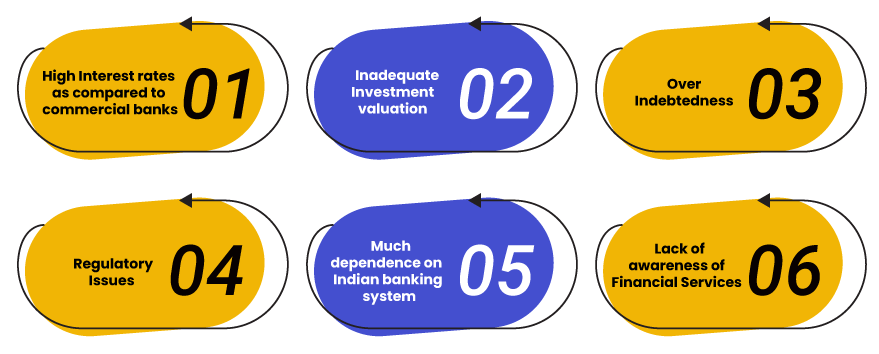What are the Major Risks Faced by Micro Finance Company in India?

Japsanjam Kaur Wadhera | Updated: Jan 25, 2021 | Category: Microfinance Company
The developing country like India is struck with poverty which results in creating hurdles in the progress of the country. The major reason for the widespread poverty in India is due to the massive disparity in the income distribution. The Indian population faces many problems such as being deprived of formal financial services as some of them belong from the impoverished and backward section of the society. The concept of micro finance was introduced in the Indian economy with the objective of providing financial services to the impoverished and backward section, especially women. The growth of the Indian micro finance company has been phenomenal since the time it was introduced. However, when it comes down to comparing with the success of commercial, banks, micro finance companies faces much challenges and have a long way to go. Therefore, this article will discuss about what are the major risks faced by Micro Finance Company in India.
Table of Contents
Some of the major risks faced by Micro Finance Company in India
The few challenges and risks faced by Micro Finance Industry are as follows:

High Interest rates as compared to commercial banks
The success of micro finance companies is limited as compared to the commercial banks in India. Most of the microfinance companies charge a very high rate of interests that 12 to 30% as compared to the commercial banks that charge around 8 to 12%. The regulatory authority that is the Reserve Bank of India (RBI) had issued guideline (2014) to remove the upper limit of 26% interest on microfinance loans. Where many of the microfinance companies benefited from the guidelines of the RBI, the borrowers were left for the worse. It has resulted in borrower indebtedness due to the high-interest rates.
Note: On 1st January 2020, the RBI issued a guideline that the average base rate to be charged by the NBFC’s (NBFC- micro finance companies) to their borrowers for the quarter beginning will be 9.16%
Inadequate Investment valuation
Where the investment valuation is necessary for the healthy functioning of the microfinance companies, the market activity of the microfinance institutions is often limited. And therefore, due to this, it becomes difficult for it to have access to the market data for the purpose of valuation. The Microfinance companies become unable to get the quality information which is needed to make investment decisions, due to the lack of reliable and consistent valuation procedure.
Over Indebtedness
The micro finance companies give loans to people without any collateral, which increases the risk of bad debts. Since the Micro finance companies deals with the impoverished and marginalized section of the society, it intends to improve the standard of living, and therefore over- indebtedness creates a severe challenge in its growth. The act of multiple borrowings by the clients and inefficient risk management are relatively the most common factors that pressurize and creates worrisome for the microfinance industry in India.
In order to grow efficiently, proper infrastructural planning is required in which the microfinance companies evidently lacks. Also, the lack of apex control over the microfinance industry is also the cause of over-indebtedness. Over-indebtedness makes the microfinance companies vulnerable to credit risk and also makes the cost of monitoring higher than they have to incur in order to stay profitable in the long run.
Regulatory Issues
Reserve Bank of India (RBI[1]) is a regulatory body for the micro finance companies in India. However, the supervision and help of the RBI is probably more towards the commercial banks as compared to the micro finance companies. The needs and the structure of the micro finance companies in India is entirely different from the other lending institutions.
Many of the issues of the micro finance companies are left unaddressed and the industry is struggling to sustain. Even though the new regulations have resulted in operational and structural changes, but it has also resulted in obscurity and ambiguity in conducting the norms. The result is of less than the highest standard or quality of performance and failure in developing new financial products and services. Definitely, there is a need for a separate regulatory authority for the micro finance company in India.
Much dependence on Indian banking system
The micro finance company registration when is done under Non- Governmental organization, it is dependent upon the financial institutions such a commercial banks for funds in order to carry out its lending activities. And many of the commercial banks are private institutions charging high interest rates and sanction loans for a very shorter period. The major dependence of micro finance company in India on the commercial banks makes it inefficient and incompetent as a lending partner.
Lack of awareness of Financial Services
A major population in India fails to understand the basic concept of financial services. There is a lack of awareness among the people in India regarding the financial services provided by the micro finance companies. This lack of awareness and knowledge is a significant factor of drawback from getting easy credits from micro finance companies to meet financial needs by the people.
This also contributes to the widespread financial exclusion in the country. Another added task for the micro finance companies becomes to educate and establish trust before the people regarding granting loans or providing easy credits to them. The lack of awareness about the products and policies provided by the micro finance companies make it difficult for this industry to cope with the excessive competition in the Country.
Conclusion
The micro finance company offers financial services to the low income groups where the finance requirement is comparatively less as to the other sectors of the society. The purpose of introducing micro finance company in India is to uplift the backward section of the society. However, there are many challenges and major risks faced by micro finance company in India. It lags behind in terms of operational, structural and financial processes which restrain it from achieving its goals and purposes. Therefore, there is a need for the government to take initiatives and necessary steps to make this industry thrive and strengthen the functioning by setting guidelines for micro finance companies.
Also, Read: Web Aggregator License in India: Its Concept & Process To Register














